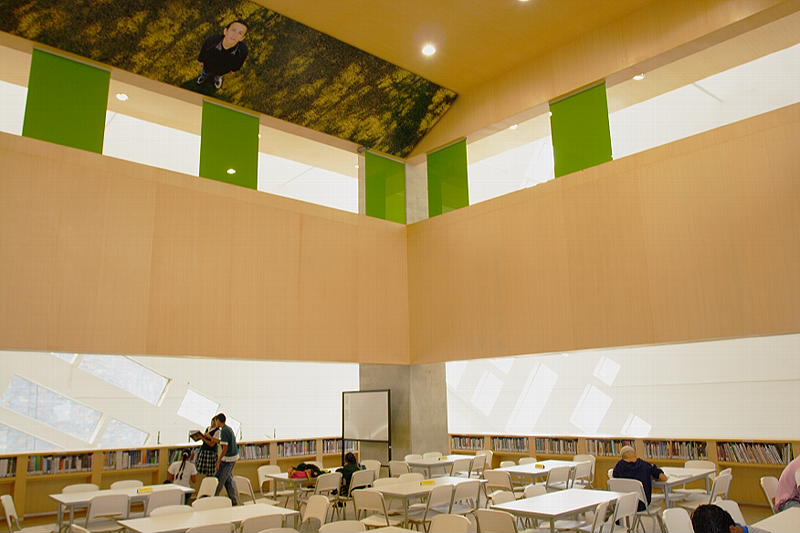Everyone, I have a new hero.
Yesterday our studio arranged an audience with Sergio Fajardo, former mayor of Medellin, current governor of its home state of Antioquia, and potential next President of Colombia. He's a wily, brilliant mathematician-turned-politician, and he's nothing short of prophetic. I sat directly next to him for an hour as he laid out his ingenious strategy for the total transformation of an impoverished and crime-ridden city. For instance, he took these neighborhoods of informal settlement which line the steep parts of the valley and once took 3 hours to ascend to through steep, narrow, drug-infested murderous alleys...
...and cautiously inserted these cable cars which connect to the central valley metro via free transfer and bring you through 3 stops to the top in about 12 minutes.
At the stops, and along the way, one will find stunning new architectural edifices, built around programs of culture, education, and learning, designed by renowned **Colombian** architects, built by Colombian contractors, and sourced with Colombian materials. I offer into evidence one of his 5 "Parque Biblioteca" projects, a move which David Gouvernor has cleverly dubbed "archi-puncture":

This man hasn't just unlocked the full potential of modern architecture to empower and ennoble an oppressed city. He has also solved the mysterious political equation that releases deadlock and channels completely the energy and resources of a city's general public, wresting control and power over the built environment back from corrupt power brokers that maintain the status quo. It's nothing short of a magic act, and it has restored faith in my belief that architecture is fundamentally a political act. Read on and enjoy :)
http://www.nytimes.com/2007/07/15/world/americas/15medellin.html?pagewanted=all&_r=0
Yesterday our studio arranged an audience with Sergio Fajardo, former mayor of Medellin, current governor of its home state of Antioquia, and potential next President of Colombia. He's a wily, brilliant mathematician-turned-politician, and he's nothing short of prophetic. I sat directly next to him for an hour as he laid out his ingenious strategy for the total transformation of an impoverished and crime-ridden city. For instance, he took these neighborhoods of informal settlement which line the steep parts of the valley and once took 3 hours to ascend to through steep, narrow, drug-infested murderous alleys...
...and cautiously inserted these cable cars which connect to the central valley metro via free transfer and bring you through 3 stops to the top in about 12 minutes.
At the stops, and along the way, one will find stunning new architectural edifices, built around programs of culture, education, and learning, designed by renowned **Colombian** architects, built by Colombian contractors, and sourced with Colombian materials. I offer into evidence one of his 5 "Parque Biblioteca" projects, a move which David Gouvernor has cleverly dubbed "archi-puncture":
Photos simply cannot do justice to the jaw-dropping topography of this city. Many of the hills go beyond a 45 degree angle over the roughly 4000' ascent to the top.
Inside was buzzing with activity:

And the surrounding neighborhood has, by all accounts, been completely transformed. The cable cars caused informal settlers to clean their roofs and streets. Crime has dropped precipitously. Commerce and quality-of-life has picked up considerably for all informal settlement in these areas in the 3 years since construction. Not bad at all!
This man hasn't just unlocked the full potential of modern architecture to empower and ennoble an oppressed city. He has also solved the mysterious political equation that releases deadlock and channels completely the energy and resources of a city's general public, wresting control and power over the built environment back from corrupt power brokers that maintain the status quo. It's nothing short of a magic act, and it has restored faith in my belief that architecture is fundamentally a political act. Read on and enjoy :)
http://www.nytimes.com/2007/07/15/world/americas/15medellin.html?pagewanted=all&_r=0






No comments:
Post a Comment